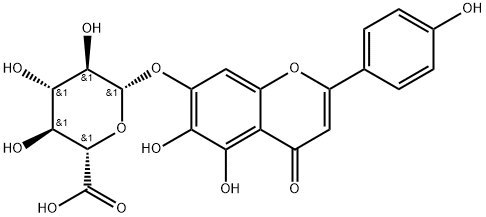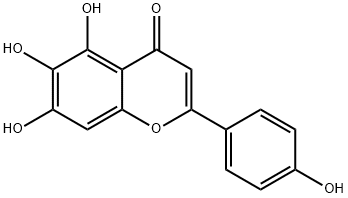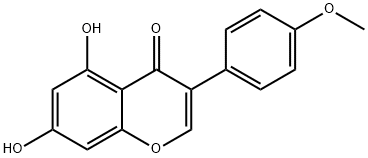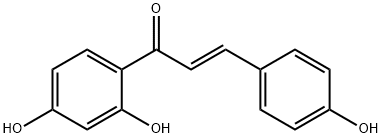Scutellarin , Analysis standard , 27740-01-8
Synonym(s):
4′,5,6,7-Tetrahydroxyflavone 7-glucuronide;5,6-Dihydroxy-2-(4-hydroxyphenyl)-4-oxo-4H-1-benzopyran-7-yl-β-D -glucopyranosiduronic acid;7-(β-D -Glucopyranuronosyloxy)-5,6-dihydroxy-2-(4-hydroxyphenyl)-4H-1-benzopyran-4-one;Breviscapin;Scutellarein-7-O-β-D -glucuronide
CAS NO.:27740-01-8
Empirical Formula: C21H18O12
Molecular Weight: 462.36
MDL number: MFCD01861503
EINECS: 1806241-263-5
| Pack Size | Price | Stock | Quantity |
| 20MG | RMB141.60 | In Stock |
|
| 100MG | RMB385.60 | In Stock |
|
| others | Enquire |
PRODUCT Properties
| Melting point: | 300~301℃ |
| Boiling point: | 891.6±65.0 °C(Predicted) |
| Density | 1.810±0.06 g/cm3(Predicted) |
| storage temp. | Sealed in dry,2-8°C |
| solubility | DMSO (Slightly), Methanol (Very Slightly, Sonicated) |
| pka | 2.72±0.70(Predicted) |
| form | Solid |
| color | Light Yellow to Yellow |
| BRN | 71779 |
| CAS DataBase Reference | 27740-01-8(CAS DataBase Reference) |
Description and Uses
Scutellarin is a flavone that has been found in S. barbata and has diverse biological activities, including anticancer, lipid lowering, antioxidative, and neurocognitive properties. It inhibits proliferation of PC-9 and H1975 non-small cell lung cancer (NSCLC) cells in a concentration-dependent manner and induces apoptosis and autophagy when used at a concentration of 160 μM, effects that can be blocked by the autophagy inhibitor HCQ . Scutellarin (30 and 60 mg/kg per day) reduces tumor growth in an H1975 mouse xenograft model. It decreases serum total cholesterol and LDL-cholesterol and increases HDL-cholesterol in a high-fat diet-induced mouse model of non-alcoholic fatty liver disease (NAFLD) when administered at doses of 25 and 50 mg/kg. It decreases hepatic malondialdehyde (MDA), glutamic-oxalacetic transaminase (GOT), and glutamic-pyruvic transaminase (GPT) activity, increases catalase (CAT) and total antioxidative capacity (T-AOC) activity, and increases the hepatic expression of PPARγ, PGC-1α, and Nrf2 in the same model. Scutellarin (5, 25, and 50 mg/kg per day) also prevents deficits in spatial and novel object memory in rats in the Y maze and novel object recognition test, respectively.
Scutellarin is an active flavonoid component from the medical plant Erigeron breviscapus (Vant) Hand-Mazz. Scutellarin is used as a micrpcirculation promoter for the treatment of cardio-cerebrovascular diseases. Studies suggest that Scutellarin has anti-cancer properties and has been shown to enhance apoptosis of tumor cells.
Safety
| Safety Statements | 24/25 |
| WGK Germany | 3 |
| HS Code | 29389090 |




